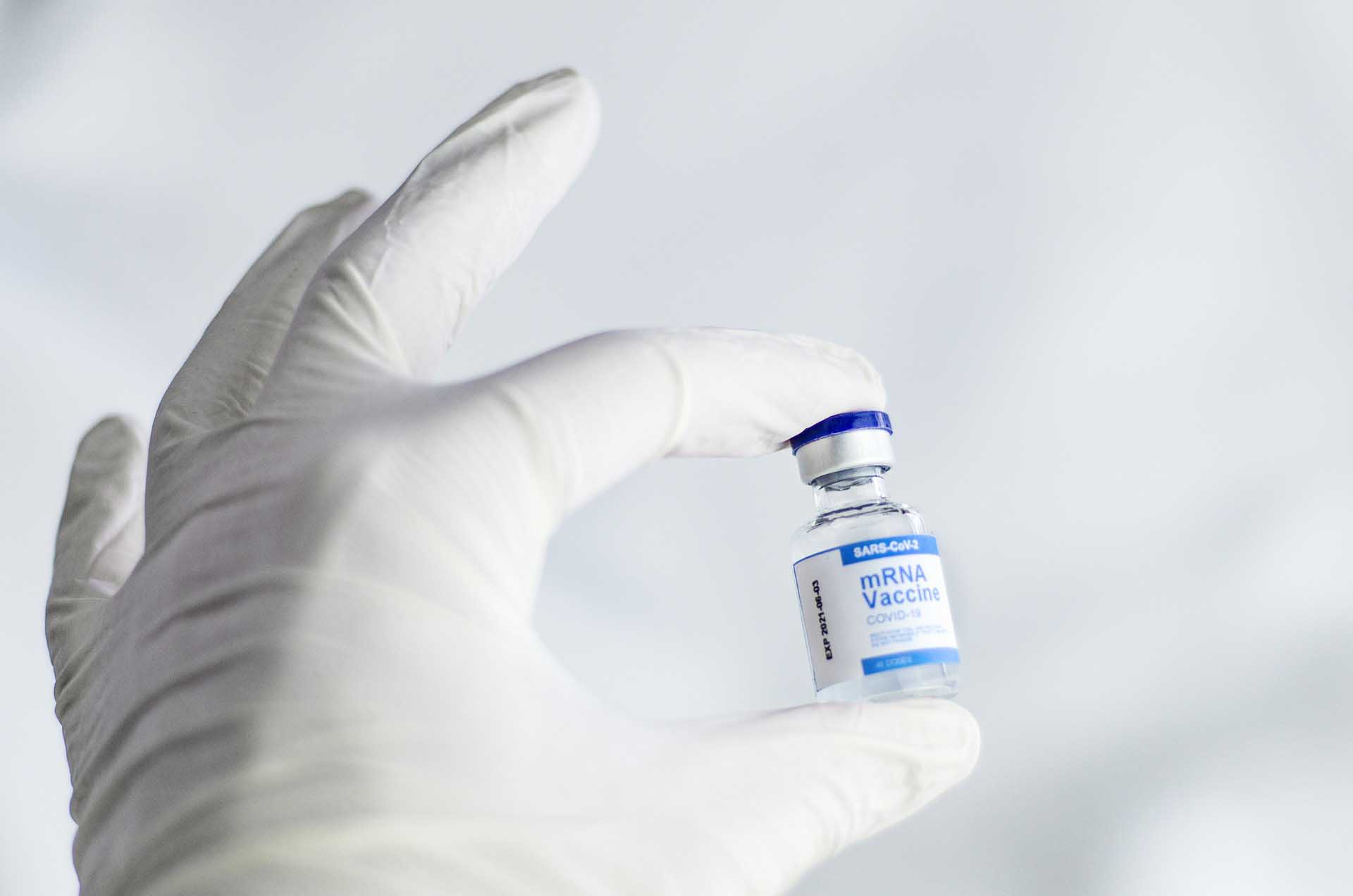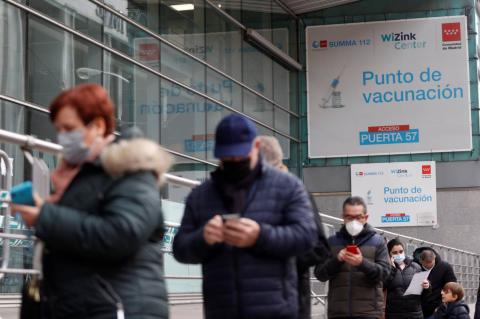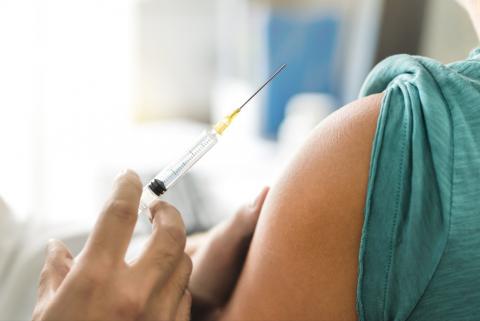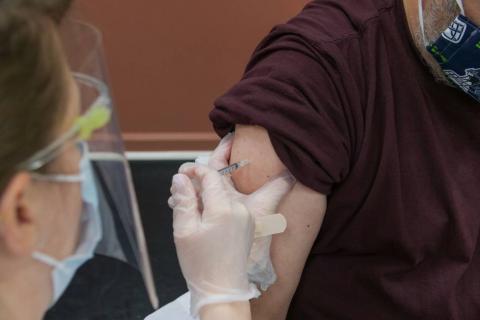The data confirm that it is the vaccines, in their full schedule, that are holding back the onslaught of the sixth wave in hospitals: "A vaccinated person between 60 and 79 years of age is 16 times less likely to be hospitalised, 29 times less likely to go to an ICU and 20 times less likely to die," said the Health Minister at a press conference yesterday.
But there is also a loss of protection from vaccines against mild illness and infection after a period of time.
Several studies, including the ENE-COVID Senior study, the results of which were presented yesterday by the Health Ministry, show that the booster dose restores defences and places the vaccinated person "in a zone of immunological safety", said the director of the Carlos III Health Institute (ISCIII), Cristóbal Belda. "A third vaccine dose in patients over 65 years of age - the population studied in ENE-COVID Senior - increases overall antibody titres against the receptor binding domain (RBD) by more than 20-fold," he said.
Are additional doses and booster doses the same thing?
No. As this Ministry of Health guidance makes clear, the additional dose is a third dose required for people with weakened immune systems. For them, the full (or primovaccination) schedule consists of three doses.
The booster dose is the dose given to people with normal immune systems after they have received their full or primary vaccination.
If I don't get the booster, do I lose protection?
Yes, especially now that the dominant variant in Spain is omicron. All studies find that the effectiveness of the vaccine "declines as time elapses since the last dose and improves after a booster dose," according to the latest report from the Spanish Health Ministry (18 December), and the phenomenon is more pronounced with omicron. "The effectiveness against symptomatic [omicron] infection estimated in a UK study was between 0% and 19% after two doses, and between 54% and 77% after a booster dose," the report states. Protection against hospitalisation, however, "remains high".
The risk of infection while vaccinated and of reinfection (after the disease has passed) is also higher with omicron. A study by the British Imperial College has estimated a 5.4 times higher risk of reinfection for omicron than for delta in England.
If the full regimen protects against severe disease, why do I need a booster dose?
Protection against severe disease is maintained with the full vaccination schedule thanks to cell-mediated immunity, which is responsible for "storing memory of past attacks", Carmen Martín, an immunologist at the Centro de Hemoterapia y Hemodonación de Castilla y León, told SINC. But antibodies block the key with which the virus enters cells, thus preventing infection.
The booster dose, by recovering circulating antibodies, strengthens the defensive barrier against infection and also, therefore, contributes to curbing community transmission. For this reason, "due to the current epidemiological context and the expansion of the omicron variant, it is recommended to continue increasing vaccination coverage percentages and the administration of booster doses in target populations," says the Health report.
Is it recommended for the whole population?
On 5 October 2021, the Public Health Commission approved the recommendation to administer a booster dose to people over 70 years of age. In the following months, the recommendation has been extended to various groups, until on 13 January it was extended to everyone over 18 years of age "in an orderly manner by age cohorts and prioritising people with risk conditions and those who have received their first vaccination the longest", according to the vaccination strategy page.
Is it also for pregnant women?
Yes, the Federation of Spanish Scientific and Medical Associations (FACME), including the Spanish Society of Gynaecology and Obstetrics (SEGO), has updated its recommendations on the anticovid vaccine in pregnant women and states that "there is no data to suggest that the risk of the third dose is different from that of the previous doses, either for the mother or for the foetus".
What about children?
The head of EMA's Vaccine Strategy, Marco Cavaleri, said at a press conference a week ago that there is still not enough data to recommend a third dose for children under 12 years of age. Also, in a recent meeting with the media, representatives of the World Health Organisation (WHO) have denied that there is currently any evidence that a third dose is necessary in this age group.
When do I take it?
The dates for administering the third dose vary according to some circumstances. In general, five months should have passed since the second dose if the first vaccination was with an mRNA vaccine (Pfizer or Moderna), and three months if you received one dose of Janssen or two doses of Vaxzevria (AstraZeneca). But there are exceptions (see questions below).
What if I was infected before the first vaccine or between doses?
In both cases, the recall will be after five months of the full course if the last dose was with Pfizer or Moderna, or after three months if it was with the AstraZeneca or Janssen vaccine, specifies Health.
What happens if I am infected after having the full course?
You have to wait five months from the last dose received if it was with an mRNA vaccine, and three months if it was with a Vaxzevria or Janssen vaccine. In addition, the following conditions must be met: the disease must have been completely overcome; the isolation period must have ended; and at least four weeks must have passed since the diagnosis of infection, although administration is recommended five months after the diagnosis of infection.
The latter was announced on 25 January, after the decision was taken at the Public Health Commission meeting.
These guidelines are valid regardless of the primary vaccination schedule received (2 doses of Vaxzevria, 2 doses of mRNA vaccines, 1 dose of Janssen, 1 dose of Vaxzevria+1 dose of mRNA vaccine, covid-19 + 1 dose of any vaccine).
If there are only four weeks between infection and booster -contagion after full course-, is there any risk?
No, as several immunologists explained to the Covid Vaccine Media Hub: "It will not be harmful," says Ignacio J. Molina, Professor of Immunology at the University of Granada. "Re-immunisation has been brought forward because a person infected with delta can easily be infected with omicron. The period would influence the level of efficacy of the response and protection against the new variant, but in no case would it represent a higher risk of adverse effects.
Salvador Iborra, Immunologist at the Complutense University of Madrid, is of the same opinion: "Accelerating the third dose would not be harmful for those people who, having received the full regimen, have been infected with the virus".
What happens if you receive the third dose when you are unknowingly infected?
If you have symptoms compatible with covid-19, the recommendation is to check that you are not infected before receiving any dose of the vaccine. But what if you have received the vaccine when you were positive without knowing it, because you did not have any symptoms and they appeared immediately afterwards? Marcos López Hoyos, president of the Spanish Society of Immunology, told SINC that "nothing happens". It is a situation that has probably occurred many times without the vaccinated person being aware of it.
Why can the third dose be of a different vaccine (heterologous schedule)?
Studies indicate that heterologous vaccination gives better results. Last December the Spanish Medicines Agency echoed the recommendations of other evaluating bodies and stated: "Evidence suggests that the combination of viral vector-based vaccines and mRNA vaccines produces good levels of antibodies against covid-19 virus (SARS-CoV-2) and a higher T-cell response than when the same vaccine is used, either in primary or booster vaccination. Heterologous regimens are generally well tolerated.
Will there be a fourth dose?
The future strategy for further curbing the pandemic has not yet been mapped out, EMA Vaccine Strategy Director Marco Cavaleri commented recently. The EMA does not believe that giving booster doses every few months is "sustainable in the long term (...). We cannot continue to give booster doses every three or four months [to the general population].
The vulnerable population will receive more doses. On 13 January, Health announced that "those who received additional doses of mRNA vaccine because they are considered to be at higher risk" - group 7 of the vaccination strategy - or are on immunosuppressive drugs - update 9 of the strategy - will receive a fourth dose five months after the last dose.




